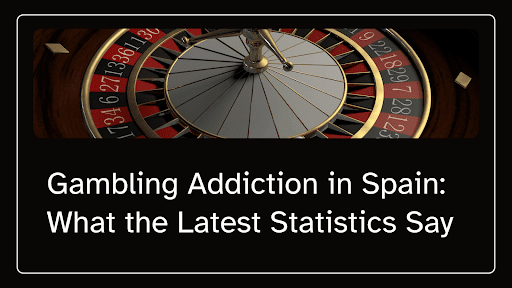
The gambling sector has been growing steadily for many decades, and the rapid evolution of its digital alternative boosted user excitement in this risky entertainment. The activity is legal and regulated in most European countries, and Spain is no exception. Statistics show that up to 39% of the state’s residents regularly engage in gambling. And despite the government’s efforts to minimise the negative impact of online casinos on the population, compulsive gaming rates continue growing.
Gambling Landscape in Spain & Growing Rate of Disorders
Like in many other countries globally, online casinos are more in demand than land-based alternatives. Players value convenience and accessibility, and the modern iGaming market allows them to access the most thrilling games and slots from any device. Only licensed and regulated platforms are legal, and both in-country and offshore certifications are acceptable.
The Spanish government aims to make the industry more controlled, following the UK’s example, which has the most developed legislation on the continent. The British authority has already launched a nationwide self-exclusion tool that covers all websites registered in the jurisdiction. However, locals can still take advantage of casinos and betting sites not on GamStop without the blocking feature and have limitless fun. As regulations evolve, it will be interesting to see how other countries adapt and balance consumer protection with the freedom of choice in the online gaming sector.
Gambling addiction rates in Spain are alarming. Approximately 1.6% of its residents aged 15 to 64 struggle with compulsive habits. However, many users prefer to hide their harmful behaviours and never report their problems to health institutions and regulatory authorities.
Therefore, the number of people suffering from gaming-related disorders can be higher, which is the main concern for the country’s sector. The Spanish Ministry of Health claims that over 670,000 residents have problems with self-control when gambling, and things only get worse due to the lack of regulations.
Coping with the Challenge: Steps Taken by the Government
Like other European countries, Spain adheres to globally accepted standards, and its regulatory authority now concentrates on increasing user awareness about the possible negative consequences of uncontrolled gambling. Each online casino and sportsbook operating legally in the country must provide instant access to support tools and helplines. Therefore, users with the first signs of compulsive disorders can get timely qualified assistance.
Moreover, reputable Spanish gambling sites must encourage customers to keep track of their actions when engaging in this risky entertainment. Solutions like AI-based monitoring technologies are becoming more widespread in online casinos. This mechanism checks user activities and recommends they take a break if excessive gambling is noticed.
General Directorate of Gambling Regulation Launching Self-Exclusion
DGOJ is the main gambling regulatory authority that issues licences and supervises the country’s industry. This body ensures that all operators in the country comply with the requirements and standards. Companies must ensure fair and transparent conditions for all users and prevent minors from joining online casinos and bookmaker sites. Moreover, local operators are obliged to inform customers about the potential harm and provide instant access to treatment organisations.
Following the UK’s example, Spain has recently concentrated on launching and promoting a self-exclusion program. While GamStop is unavailable beyond British borders, Spanish players can participate in the General Register of Gaming Access Bans. Similarly to GamStop, the tool covers online casinos and sportsbooks registered in the jurisdiction.
Users desiring to eliminate their negative gambling habits can voluntarily join the program and choose the self-exclusion terms. Unlike GamStop, the tool doesn’t automatically ban players by analysing their actions, so Spanish residents must be self-conscious and responsible.
Efficiency of Self-Exclusion and Further Advancements
Although Spain launched self-exclusion in 2018, it’s still not as widespread as British GamStop. However, it has already shown positive results. The number of registrations in the General Register of Gaming Access Bans demonstrates that more gamblers expressed the desire to cope with the problem.
Currently, the Spanish regulatory authority concentrates on promoting a responsible approach to this risky entertainment and motivates casino enthusiasts to join self-exclusion when noticing the first symptoms. While self-exclusion can help individuals regain control over their gambling habits, it’s important to consider the pros and cons of it. On the one hand, it provides a valuable tool for those seeking to prevent excessive gambling, but on the other hand, it can also limit access to entertainment for those who may not yet require such a drastic measure. Balancing protection with personal freedom remains a key challenge for regulators.
Multiple initiatives for safer gaming have been launched. Moreover, the government regularly updates industry regulations to ensure consumer protection. For instance, the latest amendments on the number of slot machines and thorough control over the existing games. DGOJ aims to minimise gaming-related harm in the country, especially focusing on the younger generation.
The Final Word
Gambling is fairly popular in Spain, and the industry is legal. However, addiction rates are alarming, and the government is implementing various measures to resolve this challenge. Unfortunately, a significant number of people targeted by the disorder are minors, so online casinos are required to strengthen verification policies to eliminate the engagement of users under 18.
Besides, DGOJ launched safer gaming initiatives to inform players about the possible consequences and encourage them to be responsible. Self-exclusion is an additional tool for coping with gambling problems that has already shown its efficiency but yet has to be promoted.